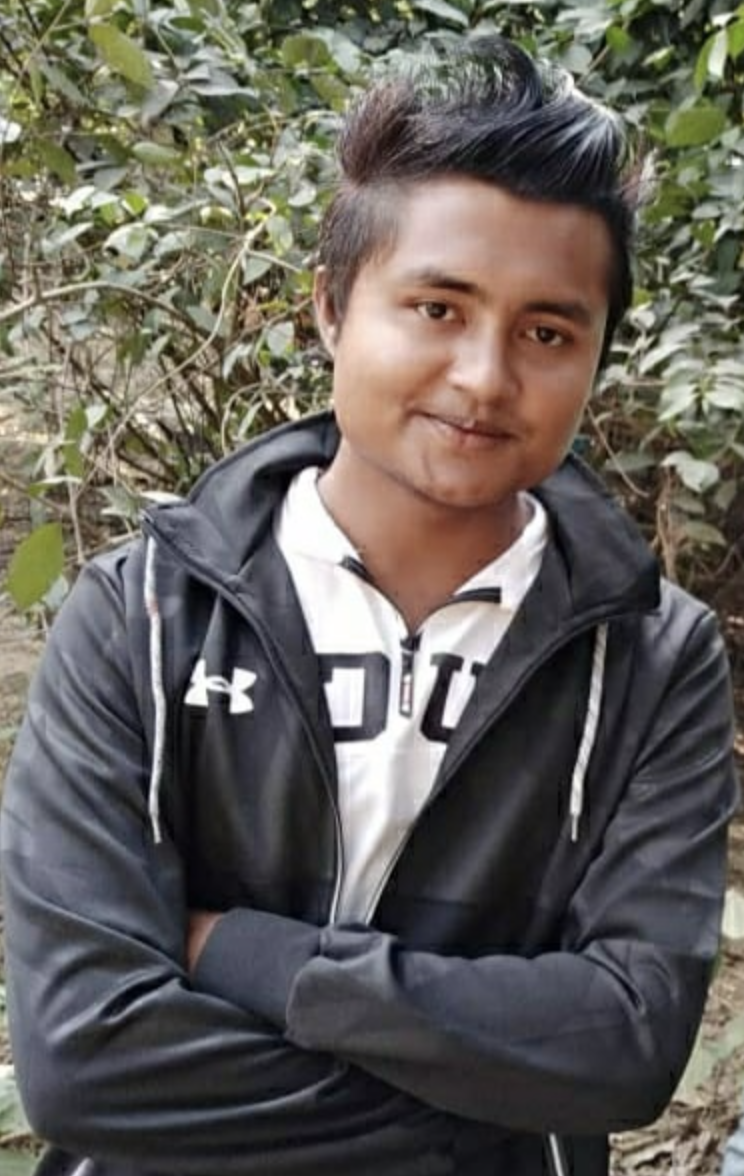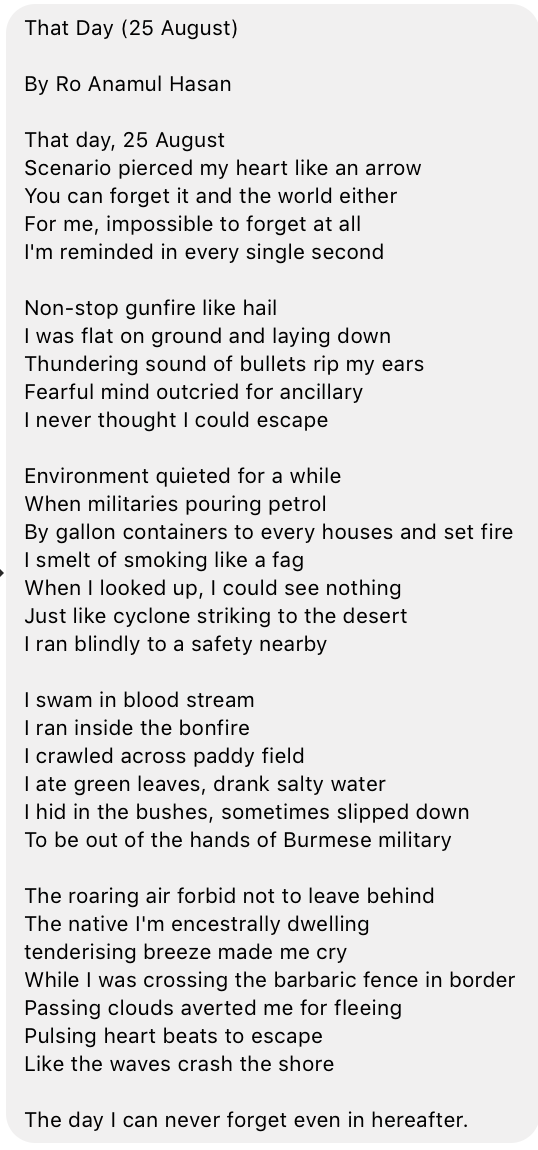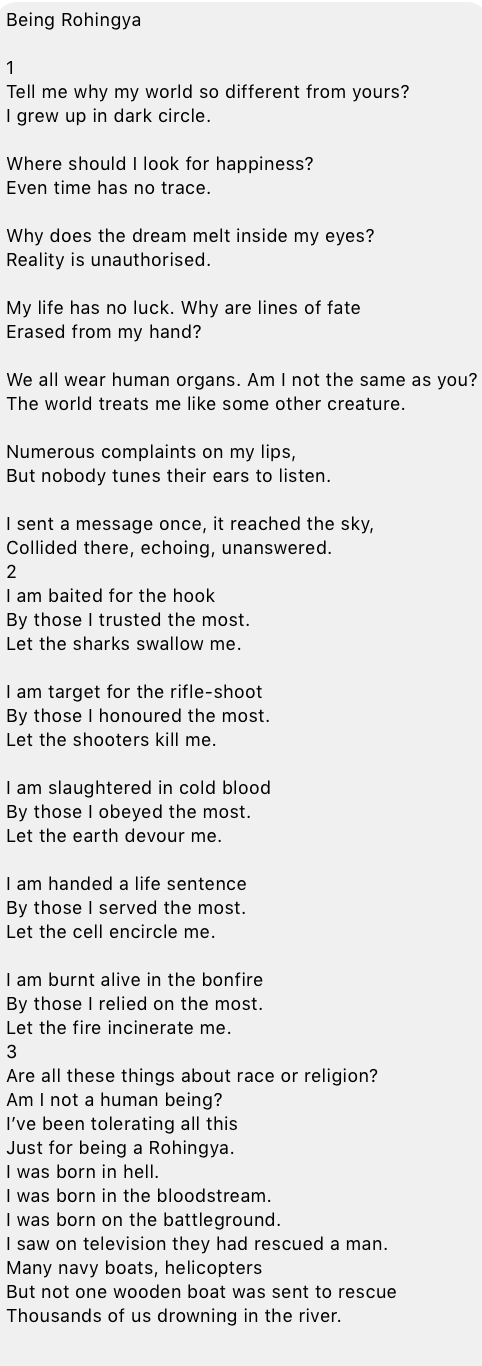25 August 2017
“The day I can never forget, even in the hereafter.”
–Ro Anamul Hasan
Ro Anamul Hasan, Rohingya poet
Harsh memories
On this #RohingyaGenocideDay, I have been asked to share the voice of yet another Rohingya refugee humanitarian and poet. You can read about other Rohingya poets here. Below you can experience two of Anamul Hasan’s poems, and, scrolling down, you can hear his voice as he explains why he writes.
Like the other young men and women I have profiled, Anamul Hasan is a ‘refugee humanitarian’, and has worked with MSF as an interpreter, the Danish Refugee Council (DRC) doing field visits and data entry for IOM. These international humanitarian organizations are doing a good job, he tells me, though it can never be enough. Like many of his friends, he struggles to make meaning of his life and uses poetry to remember and to lay bare his  memories and emotions. His poems are also a cry out to those beyond his crowded world in a refugee camp in Cox’s Bazar, Bangladesh.
memories and emotions. His poems are also a cry out to those beyond his crowded world in a refugee camp in Cox’s Bazar, Bangladesh.
Like the other poets I have met, he feels that reaching out to the larger world may somehow help the Rohingya efforts to be treated with justice and to be able, eventually and under the right conditions, to return home to Burma.
Anamul tells me he had seven family members killed by the military on August 25, 2017, all this taking place in his Burmese village. He barely made it out alive, escaping gunfire, and in the first poem he describes that ordeal in graphic detail. In the second poem he laments the circumstances of his life, none of which have been of his making. He describes his life as being in a prison cell, but having committed no crime.
Anamul and other Rohingya poets are profiled in this Frontier Myanmar article.
Anamuls poem’s
[Note: With his permission and approval I have lightly edited both poems.]
That Day (25 August)
By Ro Anamul Hasan
That day, 25 August
Scenario pierced my heart like an arrow
You can forget it and the world either
For me, impossible to forget at all
I’m reminded every single second
Non-stop gunfire like hail
I was flat on the ground and laying down
Thundering sound of bullets rip my ears
Fearful mind outcried for help
I never thought I could escape
Environment quieted for a while
When militaries pouring petrol
By gallon containers to every house and set fire
I smelled smoke, lying like a crushed trash
When I looked up, I could see nothing
Just like a cyclone striking the desert
I ran blindly to a safety nearby
I swam in a bloody stream
I ran inside the bonfire
I crawled across paddy field
I ate green leaves, drank salty water
I hid in the bushes, sometimes crouching down
To be out of the hands of Burmese military
The roaring air forbid me not to leave behind
The native land of my ancestrally dwelling
The sweet breeze made me cry
While I was crossing the barbaric fence in the border
Passing clouds averted me for fleeing
My pulsing heart beats to escape
Like waves crashing on the shore
The day I can never forget, even in the hereafter.
Being Rohingya
1
Tell me why my world is so different from yours?
I grew up in dark circle.
Where should I look for happiness?
Even time has no trace.
Why does the dream melt inside my eyes?
Reality is unauthorised.
My life has no luck. Why are lines of fate
Erased from my hand?
We all have human organs. Am I not the same as you?
The world treats me like some other creature.
Numerous complaints on my lips,
But nobody tunes their ears to listen.
I sent a message once, it reached the sky,
Collided there, echoing, unanswered.
2
I am baited for the hook
By those I trusted the most.
Let the sharks swallow me.
I am target for the rifle-shoot
By those I honoured the most.
Let the shooters kill me.
I am slaughtered in cold blood
By those I obeyed the most.
Let the earth devour me.
I am handed a life sentence
By those I served the most.
Let the cell encircle me.
I am burnt alive in the bonfire
By those I relied on the most.
Let the fire incinerate me.
3
Are all these things about race or religion?
Am I not a human being?
I’ve been enduring all this
Just for being a Rohingya.
I was born in hell.
I was born in the bloodstream.
I was born on the battleground.
I saw on television they had rescued a man.
Many navy boats, helicopters
But not one wooden boat was sent to rescue
Thousands of us drowning in the river.
Why write these poems?
Given all the details of his situation, the question arises ‘why write poems?’ Below is a video Anamul sent to me in which he explains his motivation. There are subtitles, but I have also added the text below.
Here is the text in the video above:
“I am Ro Anamul Hasan, a Rohingya refugee, living in the world largest refugee camp, in Cox’s Bazaar, Bangladesh.
I compose poems by aiming that how the world can hear our voice and how people can feel like me after reading my poem. For me, poetry is raising voice to the world. As I am under pressure, I’m persecuted, I’m discriminated. All these force me to write something. Also it makes easier to compose poem. So I chose poetry to tell my painful stories to the world through my poems . Perhaps, the world may know what kinds of things are floating inside our minds.”
If you have any questions, comment, or feedback please contact me here (arcaro@elon.edu).


 Follow
Follow